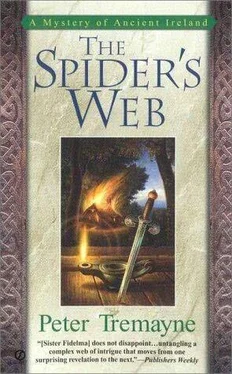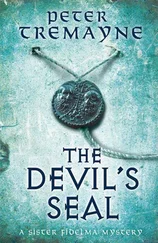Peter Tremayne - The Spider's Web
Здесь есть возможность читать онлайн «Peter Tremayne - The Spider's Web» весь текст электронной книги совершенно бесплатно (целиком полную версию без сокращений). В некоторых случаях можно слушать аудио, скачать через торрент в формате fb2 и присутствует краткое содержание. Жанр: Исторический детектив, на английском языке. Описание произведения, (предисловие) а так же отзывы посетителей доступны на портале библиотеки ЛибКат.
- Название:The Spider's Web
- Автор:
- Жанр:
- Год:неизвестен
- ISBN:нет данных
- Рейтинг книги:5 / 5. Голосов: 1
-
Избранное:Добавить в избранное
- Отзывы:
-
Ваша оценка:
- 100
- 1
- 2
- 3
- 4
- 5
The Spider's Web: краткое содержание, описание и аннотация
Предлагаем к чтению аннотацию, описание, краткое содержание или предисловие (зависит от того, что написал сам автор книги «The Spider's Web»). Если вы не нашли необходимую информацию о книге — напишите в комментариях, мы постараемся отыскать её.
The Spider's Web — читать онлайн бесплатно полную книгу (весь текст) целиком
Ниже представлен текст книги, разбитый по страницам. Система сохранения места последней прочитанной страницы, позволяет с удобством читать онлайн бесплатно книгу «The Spider's Web», без необходимости каждый раз заново искать на чём Вы остановились. Поставьте закладку, и сможете в любой момент перейти на страницу, на которой закончили чтение.
Интервал:
Закладка:
After Dubán had been sent to request a meeting with Cranat, the widow of Eber, word came that she would meet with Fidelma and Eadulf in the hall of assembly within half an hour.
Crón was already there when they entered, seated in her chair of office. Before her, just below the dais, were the same seats as before. This time Fidelma noticed that a second chair had been placed next to Crón’s chair of office. Fidelma and Eadulf had barely reached their places when a straight-backed woman entered, with a fixed, unsmiling expression. She did not glance in their direction, nor make any attempt to acknowledge them, but moved forward to the empty chair and seated herself beside her daughter.
For a woman approaching her fiftieth year, Cranat was still handsome. She had kept her figure well. There was something aristocratic about her oval face, her fair skin, white and delicate. Her golden hair had no grey in it but was worn long and flowed down below the shoulders. The hands were well formed with slender tapering fingers. Fidelma noticed that the nails were carefully cut and rounded and artificially coloured crimson. Berry juice dyed the eyebrows black and there was a hint of ruam, the juice of sprigs and berries of the elder tree, which highlighted the cheeks with the blush of red. Fidelma noticed that Cranat did not believe in stinting herself when it came to perfume. A heavy scent of roses permeated the air around her. Cranat seated herself in regal posture.
She wore a dress of red silk fringed with gold and bracelets of silver and white bronze adorned her arms while a circlet of gold encased her neck. Clearly Cranat was possessed of wealth andher bearing showed that she was also possessed of status not just the rank of the wife of chieftain of Araglin.
Fidelma stood for a few moments waiting for Cranat to even acknowledge her by raising her eyes.
Finally, it was Crón, the tanist, who ended the silence, speaking without rising from her own chair.
‘Mother, this is Fidelma, the advocate who is here to pronounce judgment on Móen.’
Only then did Cranat raise her head and Fidelma found herself staring into the same cold blue eyes of Cranat’s daughter, Crón.
‘My mother,’ went on Crón, ‘Cranat of the Déisi.’
Fidelma kept her face a mask. In the introduction, the reason for Cranat’s bearing had been explained. Legend had it that during the High Kingship of Cormac mac Airt, the sept of the Déisi had been banished from their ancestral lands around Tara. Some had fled abroad to the land of the Britons while others had settled in the kingdom of Muman where they had split into two further septs, the Déisi of the north and those of the south. That Crón had introduced her mother as ‘of the Déisi’ meant that Cranat was a daughter of a prince of her people. Even so, it did not excuse the manner in which she had refused to greet or acknowledge Fidelma. Irritation caused Fidelma’s face to redden. She had allowed this insult to her rank and position to pass unchallenged once. She could not do it a second time if she were to maintain control of this investigation.
Instead of seating herself, she calmly stepped up onto the raised platform on a level with Crón and Cranat.
‘Eadulf, place a chair here for me,’ she instructed coldly.
The look of shock on the faces of Cranat and her daughter indicated that they were not used to anyone challenging their authority.
Eadulf, trying to hide a smile of amusement, for he knew how Fidelma liked to make points of protocol when they had been forgotten, hastily seized a chair and placed it where she hadindicated. Eadulf knew that ordinarily, Fidelma did not care a jot about matters of privilege and ritual. Only if people used such matters of etiquette to wrongfully assert authority did Fidelma use her own position to put them firmly in their place.
‘Sister, you forget yourself!’
It was the first sentence Cranat had uttered, expressed in a scandalised tone.
Fidelma had taken her seat and regarded the widow of the chieftain with a bland expression.
‘What would you suggest that I have forgotten, Cranat of Araglin?’
She emphasised the choice of title softly, just enough to make a point.
Cranat swallowed noisily, unable to make any reply.
‘My mother is …’ began Crón but stopped as Fidelma turned to face her. ‘Ah …’ she suddenly realised the point of protocol Fidelma had made. She turned quickly to her mother. ‘I have neglected to tell you that Sister Fidelma is not only an advocate but is sister to Colgú of Cashel.’
Before Cranat could digest this information, Fidelma leant forward. She spoke pleasantly enough but her voice was firm.
‘The matter of my parentage aside and ignoring the kingship of my brother,’ she paused, for this was a direct demolition of Cranat’s own royal pretension, ‘I am qualified to the degree of anruth and may sit in the presence of the High King of the five kingdoms himself and speak with him on the same level.’
Cranat’s mouth became a tight thin line. She turned her ice cold eyes to focus elsewhere in the hall.
‘Now,’ Fidelma sat back and smiled broadly. There was a brisk tone in her voice. ‘Now let us leave aside the tedious matters of custom and propriety for there is more important work to do.’
Once again, there was no doubt that Fidelma was rebuking Cranat and Crón for their pretensions and they knew it. They sat in silence for there was no response that they could adequately make.
‘I need to ask you some questions, Cranat.’
The woman, sitting stiffly, sniffed. She did not bring herself to look directly at Fidelma.
‘Then I am sure that you will ask them,’ she replied without humour.
‘I am told that it was you who sent to my brother at Cashel to request a Brehon to attend here. I am told that you undertook to send to Cashel without the knowledge and approval of your daughter who is the tanist. Why was this?’
‘My daughter is young,’ Cranat said. ‘She is inexperienced in law and politics. I believe that this matter has to be properly conducted so that no stigma is allowed to attach itself to the family of Araglin.’
‘Why might that happen?’
‘The nature of the creature who committed the crimes, and the fact he was the adopted son of the lady Teafa, might incline people to speak ill of the house of Araglin.’
Fidelma thought it was a reasonable explanation.
‘Then let us return to the morning six nights ago when you heard of the death of your husband, Eber.’
‘I have already explained what happened,’ interrupted Crón hastily.
Fidelma clicked her tongue in annoyance.
‘You have told me of the events as you saw them. Now I am asking your mother.’
‘There is little to tell,’ Cranat said. ‘I was awakened by my daughter.’
‘At what time?’
‘Just as the sun was rising, I think.’
‘And what happened?’
‘She told me that Eber had been slain and that Móen had done the terrible deed. I dressed and joined her here, in the hall of assembly. As I did so, Dubán came in to say that Teafa had also been found dead from stabbing.’
‘Did you go to see Eber’s body?’
Cranat shook her head.
‘Not go to pay your last respects to your dead husband?’ Fidelma allowed a note of surprise to enter her voice.
‘My mother was upset,’ Crón intervened defensively.
Fidelma’s eyes still held those cold blue eyes of Cranat.
‘You were upset?’
‘I was upset,’ echoed Cranat.
Instinctively, Fidelma knew that Cranat was seizing the easy excuse given by her daughter.
‘Tell me why you did not share your husband’s sleeping chamber?’
There was a gasp of indignation from Crón.
Читать дальшеИнтервал:
Закладка:
Похожие книги на «The Spider's Web»
Представляем Вашему вниманию похожие книги на «The Spider's Web» списком для выбора. Мы отобрали схожую по названию и смыслу литературу в надежде предоставить читателям больше вариантов отыскать новые, интересные, ещё непрочитанные произведения.
Обсуждение, отзывы о книге «The Spider's Web» и просто собственные мнения читателей. Оставьте ваши комментарии, напишите, что Вы думаете о произведении, его смысле или главных героях. Укажите что конкретно понравилось, а что нет, и почему Вы так считаете.











